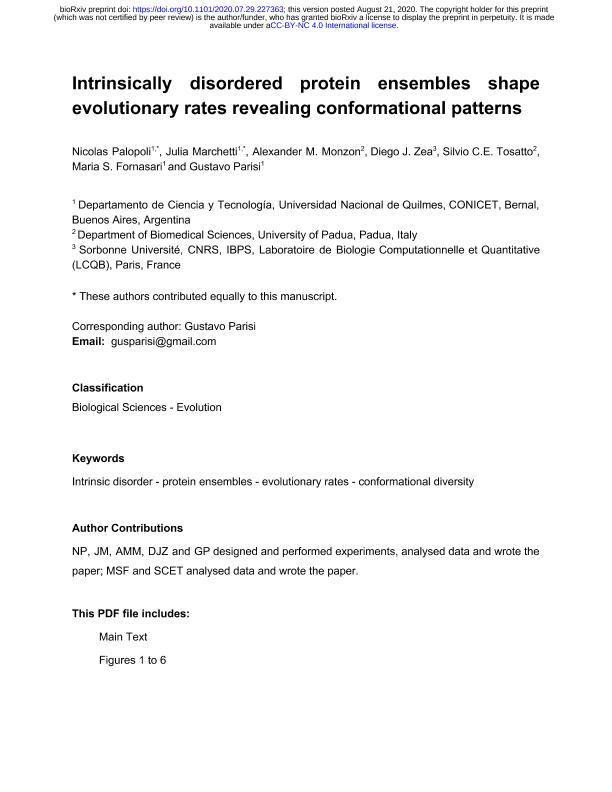Mostrar el registro sencillo del ítem
dc.contributor.author
Palopoli, Nicolás

dc.contributor.author
Marchetti, Julia

dc.contributor.author
Monzon, Alexander M.
dc.contributor.author
Zea, Diego J.
dc.contributor.author
Tosatto, Silvio C.E.
dc.contributor.author
Fornasari, Maria Silvina

dc.contributor.author
Parisi, Gustavo Daniel

dc.date.available
2022-03-18T03:53:34Z
dc.date.issued
2021-02-05
dc.identifier.citation
Palopoli, Nicolás; Marchetti, Julia; Monzon, Alexander M.; Zea, Diego J.; Tosatto, Silvio C.E.; et al.; Intrinsically Disordered Protein Ensembles Shape Evolutionary Rates Revealing Conformational Patterns; Academic Press Ltd - Elsevier Science Ltd; Journal of Molecular Biology; 433; 3; 5-2-2021; 1-12
dc.identifier.issn
0022-2836
dc.identifier.uri
http://hdl.handle.net/11336/153567
dc.description.abstract
Intrinsically disordered proteins (IDPs) lack stable tertiary structure under physiological conditions. The unique composition and complex dynamical behaviour of IDPs make them a challenge for structural biology and molecular evolution studies. Using NMR ensembles, we found that IDPs evolve under a strong site-specific evolutionary rate heterogeneity, mainly originated by different constraints derived from their inter-residue contacts. Evolutionary rate profiles correlate with the experimentally observed conformational diversity of the protein, allowing the description of different conformational patterns possibly related to their structure-function relationships. The correlation between evolutionary rates and contact information improves when structural information is taken not from any individual conformer or the whole ensemble, but from combining a limited number of conformers. Our results suggest that residue contacts in disordered regions constrain evolutionary rates to conserve the dynamic behaviour of the ensemble and that evolutionary rates can be used as a proxy for the conformational diversity of IDPs.
dc.format
application/pdf
dc.language.iso
eng
dc.publisher
Academic Press Ltd - Elsevier Science Ltd

dc.rights
info:eu-repo/semantics/openAccess
dc.rights.uri
https://creativecommons.org/licenses/by-nc/2.5/ar/
dc.subject
CONFORMATIONAL DIVERSITY
dc.subject
EVOLUTIONARY RATES
dc.subject
INTRINSIC DISORDER
dc.subject
PROTEIN ENSEMBLES
dc.subject.classification
Biología

dc.subject.classification
Ciencias Biológicas

dc.subject.classification
CIENCIAS NATURALES Y EXACTAS

dc.title
Intrinsically Disordered Protein Ensembles Shape Evolutionary Rates Revealing Conformational Patterns
dc.type
info:eu-repo/semantics/article
dc.type
info:ar-repo/semantics/artículo
dc.type
info:eu-repo/semantics/publishedVersion
dc.date.updated
2022-03-14T21:06:29Z
dc.identifier.eissn
1089-8638
dc.journal.volume
433
dc.journal.number
3
dc.journal.pagination
1-12
dc.journal.pais
Reino Unido

dc.description.fil
Fil: Palopoli, Nicolás. Universidad Nacional de Quilmes. Departamento de Ciencia y Tecnología; Argentina. Consejo Nacional de Investigaciones Científicas y Técnicas; Argentina
dc.description.fil
Fil: Marchetti, Julia. Universidad Nacional de Quilmes. Departamento de Ciencia y Tecnología; Argentina. Consejo Nacional de Investigaciones Científicas y Técnicas; Argentina
dc.description.fil
Fil: Monzon, Alexander M.. Università di Padova; Italia
dc.description.fil
Fil: Zea, Diego J.. Sorbonne University; Francia. Centre National de la Recherche Scientifique; Francia
dc.description.fil
Fil: Tosatto, Silvio C.E.. Università di Padova; Italia
dc.description.fil
Fil: Fornasari, Maria Silvina. Universidad Nacional de Quilmes. Departamento de Ciencia y Tecnología; Argentina. Consejo Nacional de Investigaciones Científicas y Técnicas; Argentina
dc.description.fil
Fil: Parisi, Gustavo Daniel. Universidad Nacional de Quilmes. Departamento de Ciencia y Tecnología; Argentina. Consejo Nacional de Investigaciones Científicas y Técnicas; Argentina
dc.journal.title
Journal of Molecular Biology

dc.relation.alternativeid
info:eu-repo/semantics/altIdentifier/url/https://www.sciencedirect.com/science/article/pii/S0022283620306768
dc.relation.alternativeid
info:eu-repo/semantics/altIdentifier/doi/http://dx.doi.org/10.1016/j.jmb.2020.166751
Archivos asociados
